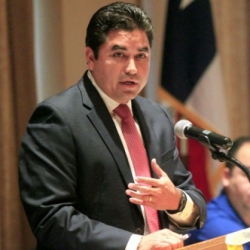Ricardo Rodriguez, the Hidalgo County District Attorney, called on support by the local police department after a raid on a local La Joya 8-liner gaming machine venue. The Hidalgo County District Attorney, “It would help us a whole lot if these agencies would follow through on these complaints. But obviously that wasn’t happening.”
The district attorney’s office normally does not get into the business of gambling raids. Ricardo Rodriguez naturally sounded defensive when asked by reporters about his raid on El Diamante, a gaming machine parlor located on Highway 83.
3 Complaints Sent to Police
One month prior to the raid, three customers of El Diamante filed complaints with the La Joya Police Department after they noticed people playing 8-liners at the establishment. Those citizens believed the gaming machine activity was illegal and they wanted the local police to get the gaming activity out of their community. According to Ricardo Rodriguez, the local police did nothing.
Before one assumes the district attorney (or anyone else) is accusing the local law enforcement of corruption, it should be noted that the City of La Joya makes a profit off of the eight-liner machines. Also, the question of whether such gaming machines are legal is still up in the air.
8-Liner Tax Revenues
The City of La Joya collects annual, quarterly, and monthly revenues from 8-liner parlors like El Diamante. The city assesses an annual $2,500 permit fee, which is equivalent to the licensing fees many U.S. states assess. The city also collects a quarterly $1,000 per-machine fee, which often adds up to serious money. Also, each establishment must pay a smaller monthly $300 “miscellaneous fee”.
An eight-liner venue with 100 gaming machines would be therefore pay the city $406,100 per year. The city collects just over $762,000 in property tax revenues, so the 8-liner payments are a significant part of the city budget.
Rodriguez Sympathizes with Cops
The district attorney was quick to sympathize with the local cops. He said, “We can speculate that because the agency in La Joya is funded and it operates through the city of La Joya. So it puts the law enforcement agency in a difficult position because they’re supposed to enforce the law.”
The police department therefore is caught between the city, which says machine gaming is legal, and the state, which says such activity is illegal. Since the police work for the city, they tend to comply with local gaming laws. Rodriguez said, “When the city has these ordinances stating how (game rooms) should operate and they know they are not operating legally, it kind of puts them in a difficult spot.”
What Are 8-Liners?
Valley Central, an online publication affiliated with Action 4 News, described 8-liners as “low-rent slot machines“. The machines are found in convenience stores and gas stations across the nation. The people of La Joya, like average Americans across the United States, wonder whether the machines are legal or not.
In California, the machines are called eight-liners, though Spanish-speakers might know them better as “maquinitas”. The Texas Public Information Act states that such casinos are legal, as long as establishments do not pay out in cash prizes. Instead, other prizes should be offered.
El Diamante Paid in Cash
When a man won $130 a month prior to the raid, he alleges that the operators paid him in cash. The document read that the filer of the complaint “did not feel right when he won $130 and he was expecting to be paid in prizes. Instead he got paid with cash.”
A week later, a local woman wrote a complaint saying that she won $120 and her winnings were paid with $20 bills. Later, a third resident said he overheard two employees complaining in El Diamante’s public restroom, saying “he overheard two men talking in the men’s room. He stated that they were talking about reprogramming the machines because they were paying out too much money and too often.”
This caused great concern about the fairness of the games, which caused the man to write into the police and ask them to investigate. District Attorney Ricardo Rodriguez says that the police should have investigated, because the public welfare is at stake. Instead, they ignored the three complaints, forcing the hand of the prosecutorial wing of the county government.
Rodriguez added, “It’s not just a concern for us, but should be a concern for the citizens in La Joya and everyone in this county.“

